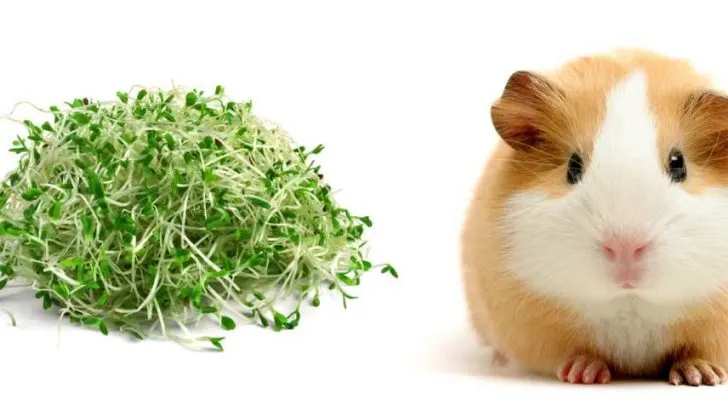We know that hay has a bunch of healthy ingredients in it and that many animals consume it because of its benefits, but what about your pet guinea pig? Read on to find out!
If you are doubting your guinea pig’s diet and asking yourself, “can guinea pigs eat alfalfa?” you’re in luck because the answer depends on your guinea pig’s health and the part and state in which this plant is. Your guinea shouldn’t make a staple food out of this.
If you want to learn when it is acceptable to feed your guinea pig alfalfa and exactly how much, continue reading this article.
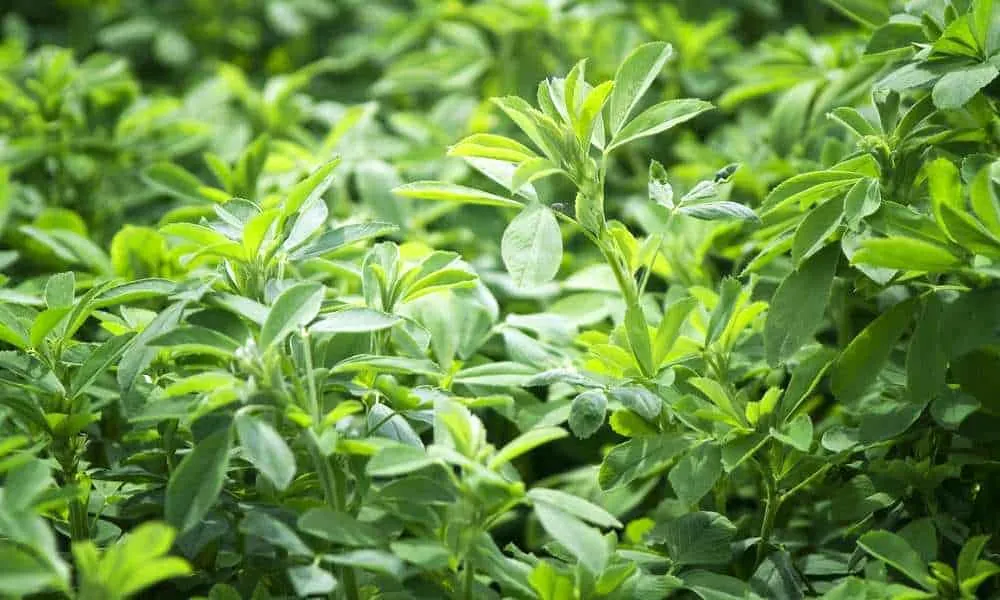
Alfalfa Plant – “Father of All Foods”
The alfalfa plant is among the essential crops out there. It is regularly cultivated and nurtured in 70 countries worldwide. Alfalfa has numerous purposes, but its most prominent one is food. Alfalfa can be fed to several domestic animals: horses, goats, sheep, pigs, and chickens.
In the past, alfalfa was used for medical purposes as well; it was used as a cure for diseases concerning kidneys, bladder, and prostate issues. It was also recommended that children or older people with a weakened immune system use this as a supplement in their nourishment.
An interesting fact about alfalfa is that it comes from the Arabic language, and it translates into “father of all foods.” And since it can be used in feeding pigs, does this include guinea pigs? Yes, it does, but not all the time.
We have alfalfa sprouts and alfalfa hay – your guinea pig is allowed to consume both of them, but only on specific terms.
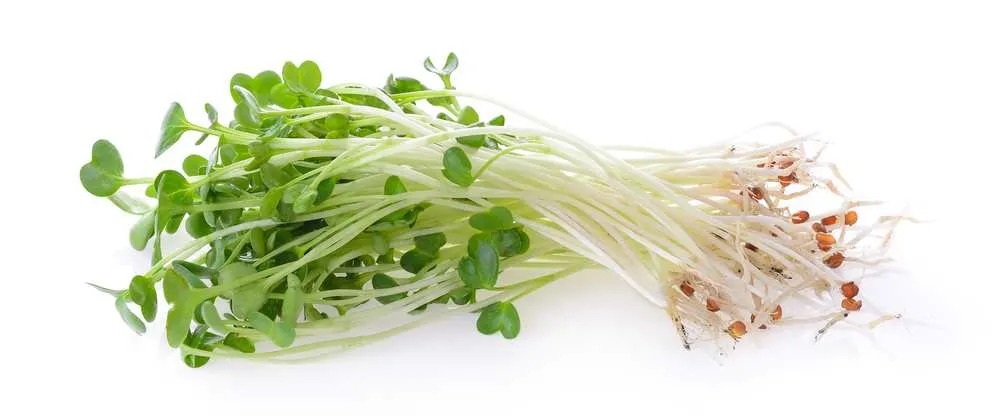
Can Guinea Pigs Eat Alfalfa Sprouts?
Yes. You are allowed to feed your pet guinea pig alfalfa sprouts either as substitute fruit or treats. Your guinea pig shouldn’t consume this nutrient more than 2 times a week.
To make it clear, let’s start by analyzing the composition. One cup of alfalfa sprouts contains:
| Calories | 7.6 |
| Proteins | 1.3 gr |
| Fat | 0.2 gr |
| Carbs | 0.7 gr |
| Fibers | 0.6 gr |
| Sugars | 0.1 gr |
Alfalfa sprouts are also rich in vitamins and minerals like magnesium, iron, folate, vitamin B1 and B2, vitamin K.
Although this ingredient should not be consumed more than 2 a week, this certainly doesn’t affect its benefits, and some of them are worth mentioning. Let’s begin.
Alfalfa’s most proud feature is that it possesses anticancer potential. As we already mentioned, this plant has been used for medical purposes. Over the years, it has been given a preventative medication. It’s an antioxidant that destroys cancer cells.
It’s great for weight loss, but only if you stick to the rules. That means giving your guinea pig only the amount that is prescribed and in specific periods. If you cross the line, you could easily cause the opposite effect.
Alfalfa sprouts are good for preventing and managing diabetes. Although we are talking about animals, this disease is very common, and upgrading and changing the diet is the most crucial factor. These sprouts are a great low-sugar treat for your guinea pig.
Consuming alfalfa sprouts every week can considerably lower bad cholesterol levels in the body and protect your guinea pig from coronary diseases, heart attacks, and strokes.
One thing this leafy green is fantastic for is boosting your pet’s immune system. By consuming it in moderate quantities, your guinea pig’s immune system will become stronger, and you won’t have to worry about your pet getting sick when the weather changes.
Alfalfa sprouts will also improve digestion and stimulate your guinea pig’s metabolism. This is extremely important because most health issues with small-sized animals arise from slowed digestion and improper metabolism balance. Alfalfa sprouts are easy to consume and even easier to digest.
What if your guinea pig had more sprouts than it was allowed? What are the side effects?
Some side-effects of improper consumption of alfalfa sprouts include infection, bleeding, and autoimmunity.
If your guinea pig happens to be allergic to alfalfa sprouts, you will notice that it has various rashes and redness on its coat. Scratching them can result in dangerous internal infections.
Another dangerous side-effect is bleeding issues. This is also connected to allergies, but it may also result from ingesting sprouts that have been infected with pesticides. After your guinea pig has ingested “bad” alfalfa, it can cause blood-clotting or surface bleeding.
The last drawback of improper consumption of alfalfa sprouts is autoimmunity. This happens when your guinea pig has been eating this leafy green every other day, for example. It might not develop an infection or gain weight; it can provoke autoimmune diseases that will attack its organism. This one is fatal, so be careful.
Okay, now that you know this, where can you find alfalfa sprouts?
Alfalfa sprouts are either found on farms in larger households that are engaged in agriculture or are regularly bought in grocery stores. Of course, the preferred option would be to go for the naturally harvested one.
In the case of animals, there is no need for kitchen interference. All you have to pay attention to is that the sprouts are not visibly damaged or sprayed with harmful chemicals.
Once you pick the sprouts, you should know that they have a short shelf life. Alfalfa sprouts can last a maximum of 3 days in your kitchen. After that, they will start to appear dry and gradually lose their nutritional value.
Also, be sure to wash them well before feeding your guinea pig this – at least under two jets of water. There are a lot of tiny bugs that might attack this leafy treat.
If you wish to keep them for a day or two in your kitchen, you should probably pack up these sprouts and put them in a plastic bag somewhere cool – not too cold like the fridge and not too hot like on the window.
If you consider all of these tips, you are 100% safe and ready to feed your guinea pig some healthy spouts!
Learn More: Can Guinea Pigs Eat Sprouts?
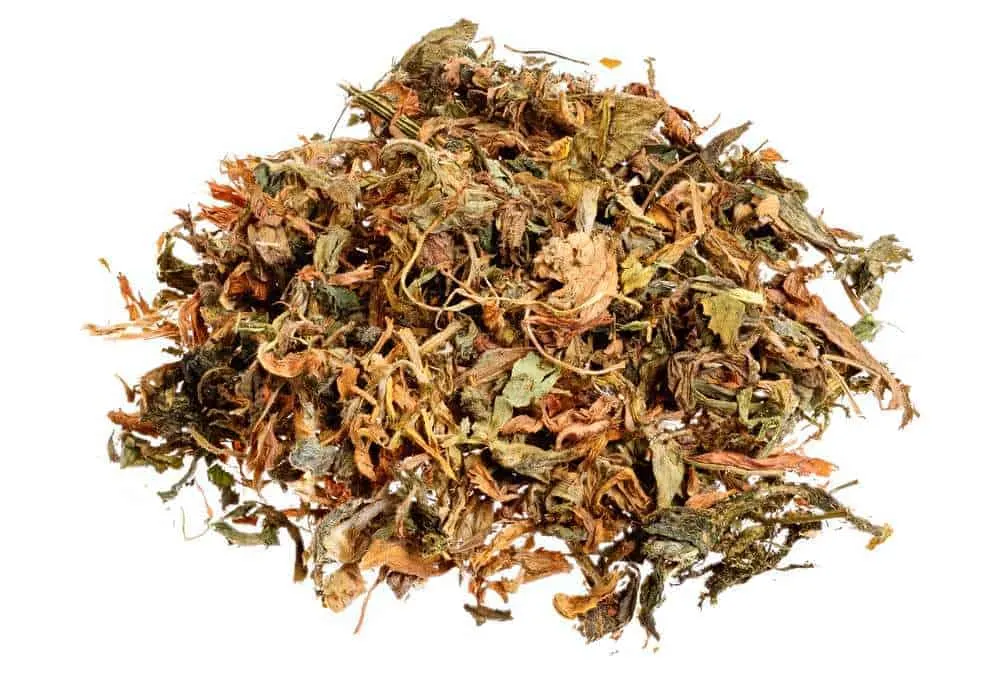
Can Guinea Pigs Eat Alfalfa Hay?
Yes. With alfalfa hay, it would be best if you consult your vet for a recommended intake. Bear in mind that this should only be used as a side dish, as an addition to pellets. This is not your guinea pig’s daily meal.
Let’s get acquainted with alfalfa hay’s nutrition facts.
| Water | 63% |
| Carbs | 30% |
| Protein | 4% |
| Fat | 1% |
This hay is also rich in various minerals and vitamins like phosphorous, potassium, sodium, magnesium, calcium, etc. Alfalfa hay has a long history. Throughout history, it was the leading food for army horses. Today, it’s fed to several different animals like cows, chickens, pigs, and it’s still a very important part of their diet.
Alfalfa’s most known purpose was turning it into bales and feeding livestock. It’s also very easy to harvest. You take two cuttings with a 35-day pause in between. When the hay is ready, it’s easy to transform them into bales.
Alfalfa hay is an inevitable part of your guinea pig’s diet because of its many benefits. Let’s list a couple of them.
Alfalfa is excellent for your guinea pig because it’s easy to digest. It’s even easier than some pellets or staple food that your pet consumes daily. Easy digestion contributes to higher energy levels (lasting 12 to 14 hours).
This hay is delicious. Its components make it palatable for many animals, even though it’s in the form of hay. High levels of protein contribute to your guinea pig’s overall health. This is what makes it nutritious. This contributes to improving your pet’s metabolism and promotes frequent digestion.
Lastly, hay is packed with vitamins and minerals. It contains a lot of calcium, which is good for strengthening bones, sodium, and potassium for boosting the immune system, and vitamin A which protects your animals from a number of chronic diseases.
Important NOTE: Alfalfa hay is primarily reserved for pregnant guinea pigs, cubs, and guinea pigs that have a vitamin deficiency. Your vet will prescribe you the recommended amount.
You need to stick to the rules because if you decide to give your pet the amount that you think is sufficient – your guinea pig could suffer from bloating problems or obesity.
Also, your guinea pig is not supposed to have too much calcium. High calcium levels in alfalfa hay can create bladder stones in guinea pigs.
Consider the following warnings:
- Don’t feed your guinea pig alfalfa hay if it’s already had problems with weight. (chronic bloaters)
- Measure the amount of alfalfa hay before feeding it to your guinea pig.
- Watch out for any pests or bacteria on the hay.
- Serve alfalfa hay with other nutrients like pellets or grass.
- Make sure your guinea pig is hydrated after eating alfalfa hay.

Other Hay Alternatives
Alfalfa is not the only hay out there for your guinea pig. There are various healthy alternatives, and we’re going to list them down for you. The great thing is that you can get almost any of these in your local pet shops or by ordering them online.
Here is your top store-bought hay for your guinea pig:
| “Small Pet Select 2nd Cutting Timothy Hay Pet Food” | Second cut timothy hayeasy storage and fresh delivery |
| “Standlee Premium Western Forage Timothy Grass” | Hand-selected and 100% naturalpromotes healthy digestion |
| “Oxbow Oat Hay Small Animal Food” | 100% organic, no additivesnatural source of strand fiber |
| Oxbow Alfalfa Small Animal Hay” | High in protein and fiberssoft texture and tasty |
Here are some tips that could come in handy if you are going shopping for hay.
- Look for all-natural ingredients – it would be best if the hay that you bought had a “100% natural or organic” mark on it.
- Go for first, second, and third cut – cuttings are very important with hay products, and the first cut is often the most nutritious.
- Avoid hay with additives – if you see that your hay contains additives or certain preservatives, put it back on the shelf and continue searching
- Moderate protein content – just because the protein levels are high, that doesn’t mean your guinea pig will find it easy to digest – take into account your pet’s health
The Importance Of Hay
You might not know it, but hay represents the largest part of your guinea pig’s diet.
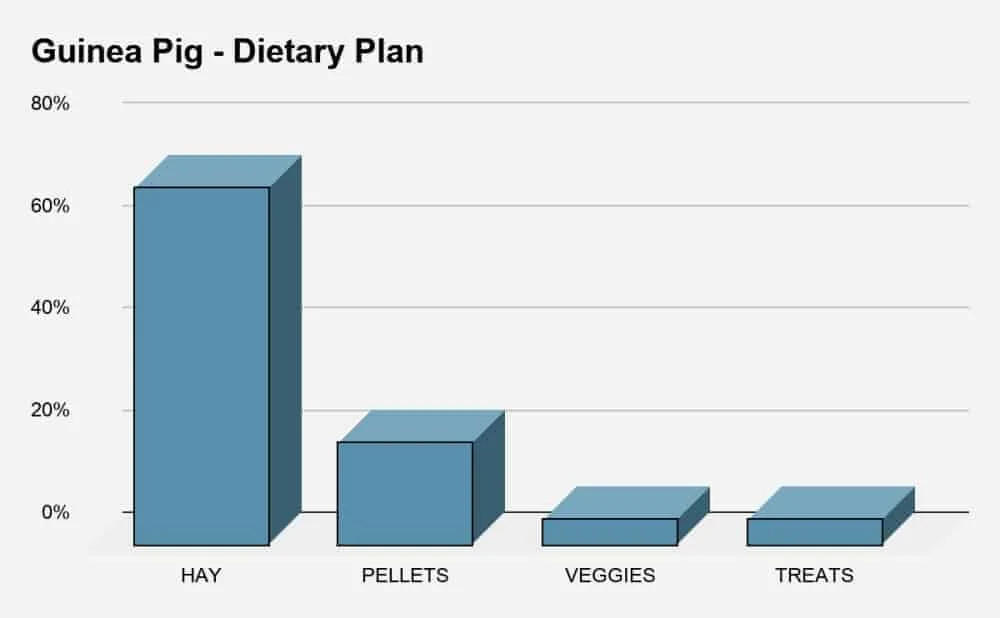
Hay makes up 70% of your guinea pig’s diet. Of course, you should pay attention to the quality of hay and consult your vet for any misunderstandings or wonders you have about this nutrient.
Pellets take the next place with 20%. Regular and moderate consumption of pellets provides your guinea pig with the recommended amount of vitamins and minerals. Include only pellets that are allowed in your pet’s diet, and be careful with combinations that include nuts.
After that, we have veggies that make up 5% of your pet’s diet. Every once in a while, you should include some healthy veggies and fruits in your guinea pig’s dietary plan – squash, for example.
If your guinea pig doesn’t like squash, here are a couple of other alternatives:
- Arugula lettuce
- Cilantro
- Spinach
- Broccoli stems
- Parsley
- Kale
- Carrot tops
- Bell peppers (small quantities only)
- Dandelion greens
See Also: Can Guinea Pigs Eat Banana Peppers?
Lastly, we have treated with 5%. You shouldn’t deny your guinea pig some treats, but you should be careful not to make everyday food out of them. Offer your guinea pig a sip of applesauce; it will love it.

